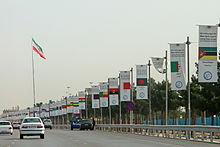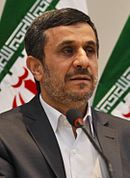16th Summit of the Non-Aligned Movement
[5] The summit's framework was the "Final Document" adopted during the Ministerial Meeting of the Non-Aligned Movement Coordinating Bureau which was held in Sharm el-Sheikh, Egypt, from 7 to 10 May.
According to Vice President Ali Saeedlou, who is the head of the organising committee, up to 7,000 participants – including delegations and the media – are expected to attend the summit.
"[64] The base of the summit's negotiations' framework is the "Final Document" adopted during the Ministerial Meeting of the Non-Aligned Movement Coordinating Bureau which was held in Sharm el-Sheikh, Egypt, from 7 to 10 May 2012.
Iran's deputy foreign minister, Mohammad Mehdi Akhondzadeh, who is also secretary general of the senior officials meeting, read parts of the draft document at the press conference and mentioned some of the main points including rejection of all forms of terrorism, as well as all form of occupation including occupation of the Palestinian territories by Israel, requesting weapons of mass destruction and nuclear weapon disarmament, condemning unilateral sanctions and replacing unipolar management of international politics with collective management.
[67] After opening remark of Ali Akbar Salehi and listening to the report of Senior Officials Meeting which was delivered by Mohammad Mehdi Akhondzadeh, the ministers starts to review the document.
[68][69] After preparation of the final document for the leaders' summit, Ali Akbar Salehi participated in a press conference and emphasized on the four main topics that were discussed at the meeting including establishment a task force in New York to pursue Palestine's membership in the United Nations and act against Israel's "illegal" measures against Palestinians, finding solution for Syrian crisis with United Nations cooperation, acting against monopolizing of the financial mechanisms in the world by using US dollar and finally establishment of a work group in New York to study the mechanisms of plural management of the world.
[70] Khamenei later commented that "the Non-Aligned Movement definitely has more political right than the US, NATO or some European countries to intervene in the Syrian issue," but "did not elaborate on what kind of role the group should have".
[73] A day after U.N. Secretary-General Ban Ki-moon asked Khamenei to lower his rhetoric on Israel,[74] Khamanei accused "the Zionist regime" of "waging disastrous wars" and "organizing state terror" throughout the world, and said the media that it and the West own repeat the "lie" that the Palestinians are "terrorists."
Khamenei also proposed improving the "political productivity" of the Non-Aligned Movement in global governance and called for a "historic document", an active secretariat, and administrative tools to achieve this.
[76][77][78][79][80][81][82] Following Khamenei's remarks, the United Nations Secretary-General Ban Ki-moon, who was described as visibly irritated,[83] denounced Iran's position towards Israel in his opening speech.
"Claiming that another UN Member State, Israel, does not have the right to exist, or describing it in racist terms, is not only utterly wrong but undermines the very principles we have all pledged to uphold.
"[83] Ahmadinejad also declares a one minute of silence in honor of the late Iranian president and prime minister, Mohammad-Ali Rajai and Mohammad-Javad Bahonar that were assassinated in same day in 1981.
[94] Indian Prime Minister, Manmohan Singh, called for a peaceful resolution of the crisis in Syria and pledged support for the Palestinian movement.
[96] The summit's final declaration ratified on 31 August by the 120 members of NAM, emphasizes on the right of all countries to develop and use of nuclear energy for peaceful purposes and notably singles out Iran.
In addition, it condemns unilateral sanctions, supports creation of a Palestinian state, advocates nuclear disarmament, human rights free from political agendas and opposition to racism and "Islamophobia".
[97] Pakistani President Asif Ali Zardari and Indian Prime Minister Manmohan Singh are likely to meet on the margins of the summit to discuss recent developments in India–Pakistan relations and in the region.
[42] UN Secretary-General Ban Ki-moon intends to talk with the Iranian leaders about issues such as Iran's nuclear programme, terrorism, human rights and the crisis in Syria.
"[101][102] Ban also said that Iran needed to take "concrete steps to address the concerns of the International Atomic Energy Agency and prove to the world its nuclear program is for peaceful purposes.
[105][106] He also met Syria's PM Wael al-Halaqi and Foreign Minister Walid Muallem and later told a news conference about the meeting that in regards to the violence "the primary responsibility resting on the government to halt its use of heavy weapons.
[107] The Anti-Defamation League slammed what they called the hate speech of Ayatollah Khamanei's opening remarks, in which he rejected Israel's legitimacy, accused "ferocious Zionist wolves" of committing daily acts of murder around the world, and perpetuated an old anti-Semitic myth of a "Zionist-controlled" media.
[citation needed] Visiting nationals from the NAM countries could avail of a tour of Tehran's historic museums, palaces and ancient sites in order to get acquainted with Persian culture and civilisation.
Haaretz reported that Prime Minister of Israel Benjamin Netanyahu had personally appealed to the secretary-general not to attend this summit and described Iran as "a regime that represents the greatest danger to world peace".
[112] In addition, according to Maariv, the Israeli Foreign Ministry ordered Israel's embassies to encourage their host countries not to attend or to send only lower-level representatives to the summit.
He hoped to meet with Supreme Leader of Iran Ali Khamenei and President Mahmoud Ahmadenijad at the sidelines of the summit to have "meaningful and fruitful discussions" and to "convey the international community's expectations that Iran make urgent progress on issues including the country's controversial nuclear program, terrorism, human rights and the crisis in Syria.
"[119] The Palestine Liberation Organization also condemned the invitation, saying that "Iran joined the Israeli choir which aims to undermine the Palestinian political system and its elected legitimacies.
"[121] On the other hand, on 26 August, a source close to Hamas declared "After intense consultations in the last few hours, a decision was taken not to attend the NAM summit that will take place in Tehran at the end of this month.
"[122] Taher al-Nono, a Hamas spokesman, appropriating Ahmadinejad told this invitation shows Iran's support of Palestine but Haniyeh excused and refrain for attendance in the summit to not intensify disagreements and divides of Palestinians, Arabs and Muslims.




